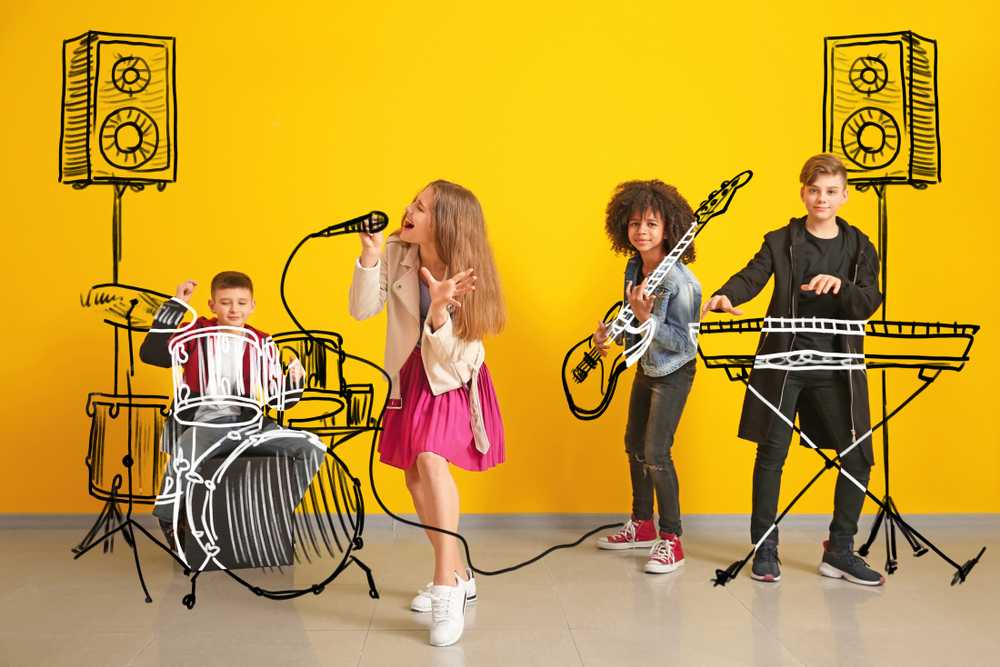
Once your child has spent some time practicing an instrument, they will likely want to share what they’ve learned. While at-home concerts and playing for family and friends can be good, real legitimate performance opportunities can be hugely helpful for a child’s confidence and practice habits. Check out some of the top benefits of performing music and some of the best opportunities for young musicians to show off their hard work.
Top Benefits of Performing Music:
- Increased motivation for practicing
- Enhances memory and retention
- Chance to share what they’ve learned
- Confidence boost in excelling
Top Opportunities for Performances:
- Recitals
- Bands
- Choirs
- Talent Shows
- School Music Products
- School Bands or Orchestras
- Family Concerts
- Holiday Parties
- Online Platforms
Why Is Performing In Front Of An Audience Important?

A musical performance is a chance for your child to show off what he or she has learned. It’s like the championship game at the end of a sports season–the thing they’ve been working toward for months and months.
Additionally, scientific studies have shown that performing in front of other people actually improves the performance by boosting brain activity. It also encourages children to problem solve and adapt should they hit a snag in their performance, and it promotes creative thinking and positive self-expression.
Performing in front of an audience also boosts confidence because the audience responds positively to a child’s performance, reassuring them that they did well. If a child messes up or makes a mistake during a performance, they learn resilience and perseverance. They also learn about empathy and compassion and are more likely to be understanding and kind when another person makes a mistake.
And finally, a child performing in front of an audience can create unforgettable experiences and moments of sheer joy, pride, and excitement in what they have accomplished.
Encouraging A Child’s Musical Talent: Where Can They Perform?
When it comes to your child’s musical journey, you want to do all you can to encourage them to keep learning and working hard on their skills. Regular performances are a key part to keeping your child motivated, and are also a great chance to showcase what they’ve been working on.
Where they can perform is really up to you, and it’s something you can discuss with your child and his or her music teacher. But really, the sky’s the limit when it comes to performance locations. Consider organizations and communities that you’re already involved in, like school, church, or work events. Plan for some family or neighborhood get-togethers where your child can play. You can also seek our local open mic nights or simply find a safe, public location and let your child play away while leaving their case open on the ground for tips. A variety of musical experiences and performance opportunities will help keep your child flexible and excited about playing their instrument. They will also appreciate the opportunities to play at their favorite places more once they’ve had experiences playing in many different places.
Performing In Recitals
When it comes to private music lessons, recitals are the bread and butter of performances. They are what kids spend countless hours working toward, and they are the big finale for their months of hard work.
A music recital is simply a showcase of music students performing what they’ve been learning and practicing. Most music students will play one or two songs on their instrument, and they will receive recognition for their hard work after they perform.
Recitals offer many benefits, which is why they are a key component in most music teacher’s curriculum. Here are some of the most important aspects of performing in a recital.
It Sets a Goal
Having a date, time, place, and song for the recital gives your child a tangible goal to work toward. It allows them to better manage their practice time and ensure they are mastering the song they are working on so that it’s the best that it can be for the recital.
It Motivates Them More in the Long-Term
After a recital, many students are excited to get back to practicing. Maybe they made a mistake that they don’t want to make again, or maybe they are just still riding high from the acknowledgment they received. Perhaps they heard another student play something that they loved, and now they want to work on learning that song. Participating in recitals gives students a new spark of excitement for their instrument that can help them learn and grow a great deal.
It Lets Them Feel Successful
Children don’t often get to share their musical abilities with family, friends, and peers. They may have played a song or two for close relatives, but there is something special about being up on a stage with their instrument and being applauded when they finish a song. It shows students that working toward something is satisfying and fulfilling, and it gives them positive recognition for all of their hard work.
It Helps Them Be Brave
Being in front of an audience for any reason can be nerve-wracking, but it’s a good way to let your child experience nervousness in a safe environment. Allowing your child to be a little scared and then seeing them conquer that fear is amazing, and it will set them up for more success in overcoming fear in the future.
It Lets Them Connect with Other Young Musicians
Children often take music lessons individually or in very small groups, but recitals are a time when many different students come together for a shared love of their instruments. It allows your child to connect with similar kids who share his or her interests, helping them feel more connected and a sense of belonging.
Starting Or Playing In A Rock & Roll Band
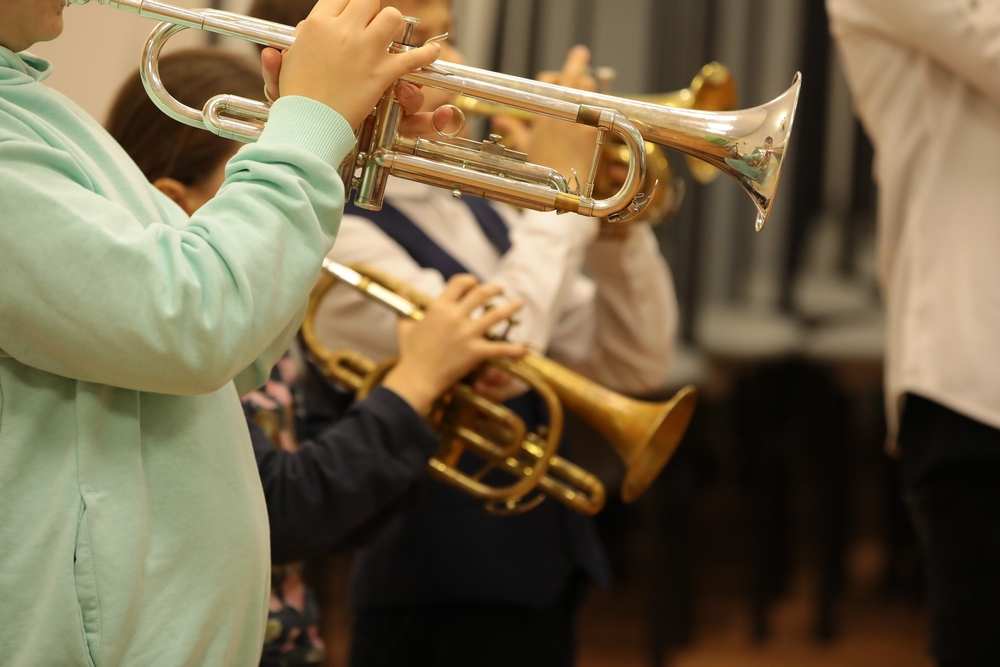
Some kids start playing an instrument with big dreams of starting their own band one day. “One day” doesn’t need to be that far off! If your child is interested in starting a band and has a few musical friends, you can help them begin their rockstar dreams now! As a bonus, they get additional performance opportunities, they practice more, and they spend time with kids who share their interests.
Depending on your child’s age, you might need to be pretty heavily involved in helping to get the band started. It could be as simple as inviting some music lesson buddies over for a “jam session.” If you can help the kids start their band, they will reap the benefits for a long time. Here are some important first steps in getting a band going.
Find Bandmates
If your child is taking group music lessons or has musical friends from church or school, this step is probably pretty simple. If you can’t think of anyone who would be a good bandmate, consider talking to your child’s music teacher, other musical adults you know, or a local music expert in your area. They can likely connect you with other kids who might be good bandmates for your child.
Find Practice Space
Depending on the instruments of the various band members, a dedicated practice space may be difficult to find. Think outside the box and check other people’s houses, local churches, nearby schools, and more to find a place for the band to practice.
Make a Practice Plan
Older kids may be able to handle making a practice plan on their own, but younger musicians may need a little more input from parents on the direction of their band. They should have a list of songs to practice, a schedule for practice times, and a plan for helping practices run smoothly.
Schedule Performances
Once the band has some solid practice time under their belt, it’s time to look for some performance opportunities. This might be a family party, a school or church event, or a local show in the community. It’s best to start small and let the band work out the natural kinks and challenges of live performances. Once they have their confidence and a strong performance routine, you can start looking at larger gigs with bigger audiences.
Singing In Choir
Choirs are known for singing in churches, but there are several choirs and choruses made up of people of all ages all across the country. Whether kids want to become singers or musicians of another kind, singing in a choir has a myriad of benefits for all children. Many schools have chorus classes and clubs starting as early as elementary school. Here are some of the top benefits of singing in a choir or chorus.
Repeated Performance Opportunities
While choruses may have a few performances a year, church choirs often perform weekly. These repetitive performance opportunities can take some of the fear out of performing and can make your child more comfortable getting up in front of an audience.
Low-Pressure Performances
Because choruses and choirs are made up of a lot of people, the performances are very low-pressure and low-risk. If someone messes up, it’s highly likely that no one will ever know. A lot of chorus and choir performances are more about showing and working on a new skill than displaying something you’ve mastered, so they should have much less pressure than a traditional recital or concert.
Exposure to Different Techniques and Styles
With a choir, in particular, groups will practice and perform different songs on a weekly basis. This means singers get the opportunity to work on different techniques and try out different styles of music, singing, and performances.
Solo Opportunities
For those looking for more voice performances and growth in their singing, solo opportunities are often available in chorus and choir settings. Even if a student isn’t pursuing singing, choruses and choirs will sometimes enlist the help of musicians to accompany them, and this provides more opportunities for young instrumentalists to perform.
Music Theory and Sight Reading Practice
Any exposure to music will help a musician grow, but choirs often sight read on a regular basis, which can be huge in helping students expand their skills. Additionally, choirs and choruses will pay even more attention to more music theory concepts in order to integrate all the different voices into a final performance.
Camaraderie
Musicians often practice and play alone, so a group setting like a choir or chorus is a great way to mix that up. Groups that sing and play music together will learn about camaraderie, socialization, teamwork, and pulling their own weight within a group, all of which are important life skills.
Performing At School Talent Shows
Schools, churches, and local community organizations host talent shows quite frequently. While this will be a mixed bag of performance types, it’s a great opportunity for young musicians to perform in front of an audience.
Depending on your child’s experience, ability, and interests, a talent show could be a chance to perform a solo piece, play a piece with a few other friends in a band, or join a large group to perform a larger composition. Regardless of what type of performance it is, entering a talent show can teach your child a lot about being successful, trying their best, and never giving up. Here are the top reasons to encourage your child to enter the next local talent show.
It Teaches Them to Pursue What They Love
Children should be encouraged to pursue what they love, even if it’s not viewed as a viable career choice by many. Think about all of the reality talent shows on TV nowadays. Judges always ask the contestants what they do for a living and then what their dream is. Rarely do the two intermix for many people, but if your child has a passion for music, they should be encouraged to embrace that thoroughly and share it with the community as often as possible.
It Teaches Them to Overcome Fear
Performing in front of their whole school is very different from performing in front of Grandma and Grandpa at the family party. When children enter local talent shows where their peers will see them, it teaches them not only about being confident in who they are and what they love, but also how to overcome fear. If you’ve ever performed anything, you know that butterflies-in-the-stomach feeling that takes over just before you go on. But you also know how incredible the feeling of success is after you’ve conquered those butterflies and put on a great performance. Teach your children to chase that joy and show them that it’s worth fighting through the fear to get to it.
It Teaches Them to Learn from Mistakes
Talent shows go awry, as do other types of music performances. It might be something minor or something big, but mistakes are bound to happen. The more opportunities your child has to perform, the more chances they will have to make mistakes, and the more you can reinforce the importance of learning from mistakes. You’ve probably heard it said that you either win or you learn. You never lose and you never fail when you bounce back from a mistake and learn from it, and a talent show is a great way to teach that important lesson to your child.
It Teaches Them to Never Give Up
We measure success not by how many times we fall, but by how many times we get back up. Teach your children to be relentless in their pursuit of whatever brings them joy and satisfaction. Allow them to enter talent shows, mess up, and try again next week. Let them sign up for several performances and keep trying until they have a winning performance or feel accomplished even without the win.
Joining School Music Productions

School productions are a fantastic way for instrumentalists and singers to hone their craft and grow in their skills. This goes beyond simply playing a particular instrument in the orchestra of a musical or singing in the chorus in a production. Any role in any type of stage production can offer benefits to musicians and non-musicians. Here are the top things kids learn when they take part in a school musical production.
Communication
Memorizing lines, speaking in front of others, and learning how to interact with others for a common goal are all hugely important skills that all kids and adults need. Being part of a school production helps with all of these things. They help students learn how to communicate clearly, both with spoken words and with their physical body language.
Confidence
There is nothing quite like performing on a stage. Going from scared out of your mind to feeling like you can conquer the world is quite a feeling, and every kid should get to experience that. The confidence that comes from school productions and performing in front of an audience cannot be taught and does not always come from within. It often comes from repeat experiences and proving to yourself over and over again that something is, in fact, possible.
Following Directions
When a child is in a school production of any kind, they have to learn to take directions from a number of people. The director, the stage crew, and even other performers will all play a role in ensuring the whole production comes together well, and each individual is responsible for following directions and doing their part.
Teamwork
Working together with others toward a common goal is a big part of being an adult, and kids who learn this skill before finishing high school are more likely to be valuable assets to future employers and co-workers. Collaboration and cooperation are huge, and kids who learn how to do these things well will see success in future relationships and experiences.
Accountability
Everyone has a role to play in a production, from lighting crew to stage hands to actors. If one person doesn’t follow their individual instructions and pull their weight during rehearsals or performances, the show won’t go as planned and others will be affected. Peer accountability is hugely motivating for many students and can be a great way to keep them working on accomplishing goals and bettering their skills.
Perseverance
Being in a production is hard work. Sometimes, rehearsals won’t go as planned or something goes wrong in a performance, but perseverance is key. Performers need to learn to keep pushing forward, get back up when they fall, and play their part for the sake of the production. Regardless of how a performance goes, students involved in it are sure to learn perseverance.
Performing In A School Band Or Orchestra Programs
A lot of kids get excited about joining the school band or orchestra when they enter sixth grade. This should absolutely be encouraged! But if your child already has experience playing an instrument before they enter sixth grade, they may have mixed feelings about joining the school band or orchestra.
Going into a sixth grade band or orchestra class with some musical ability can make a student feel isolated or uncomfortable, but it is a level of discomfort that will pass. Most sixth graders go into music classes knowing next to nothing about instruments, reading music, and music theory, so your child will have a big advantage right from the start. They shouldn’t look at this as a problem, but rather a benefit.
Some schools will have experienced musicians play with a higher grade level that is more on their level. Additionally, some students will be able to begin learning a second instrument so that they can learn and play with their peers in their grade level. This can offer even more benefits to your child both as an instrumentalist and as a student.
Joining a school band or orchestra with musical experience will also give students a chance to have a leadership role within their class. Perhaps they can help a student struggling to learn hand positions or assist in practicing reading music. Having musical knowledge will provide a special place within their band or orchestra to mentor other students, assist the music director, and continue to expand their own skills within their instrument.
Taking The Stage At Family Concerts
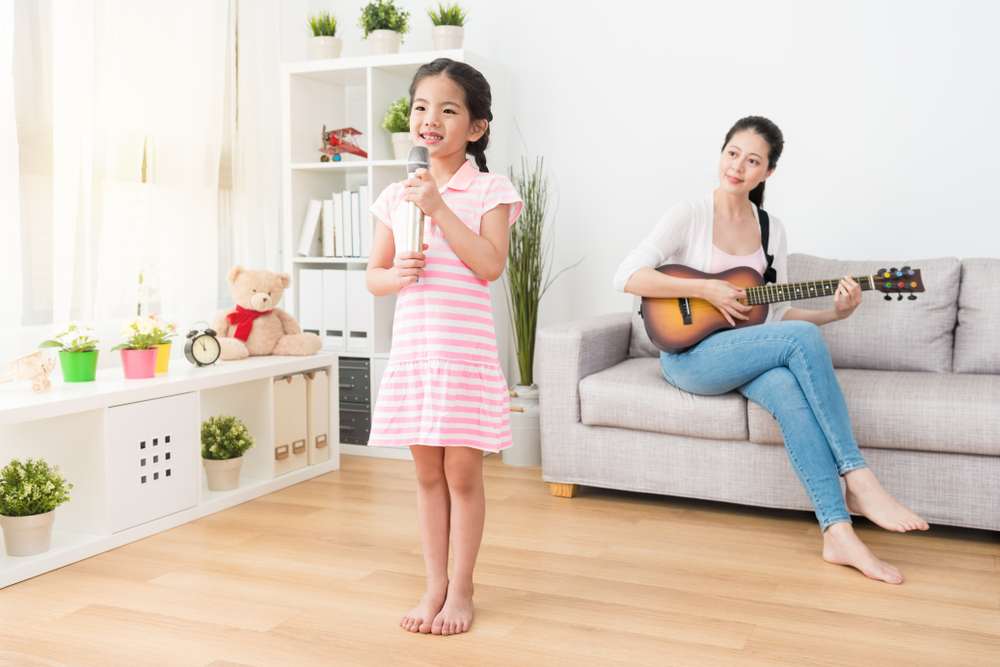
Sometimes, beginning musicians are extremely nervous about taking the stage for a performance. They may be so stressed out about it that they even consider quitting playing their instrument. If that’s the case, or if you simply want to have a little more fun with performances, consider staging a family concert.
A family concert can be as big or as small as you want it to be, with just the immediate family members or with some extended family like grandparents, aunts, uncles, and cousins. Make a big deal out of it and have everyone in the family choose something to perform. Maybe only one child knows how to play an instrument, but big sister can perform a dance, brother can demonstrate his dribbling skills, Mom can recite a poem, and Dad can share some jokes.
Make it fun and make a spectacle of it. Set up a stage, dim the lights in the audience, and pop some popcorn for those watching. Encourage one another, talk about being nervous and overcoming that fear, and express how excited you are after performing well. Go through all the emotions that would be typical of a big performance, and assure your young musician that feeling all the feelings is good and their fears are totally normal and okay.
You can also have an interactive family showcase where each person takes turns teaching their skills to their other family members. This can get your young instrumentalist excited about teaching his or her skills to the rest of the family, which will build confidence and passion as well.
Performing At Holiday Parties
Holiday parties are excellent opportunities for kids to showcase their musical skills. Perhaps it’s a family get-together, a church celebration, or a corporate event for a parent’s business. Regardless of the purpose behind the party, a large audience will likely enjoy hearing a few tunes played by a youngster, especially if the music is festive and appropriate for the party.
If you know your child will be invited to or attending a Christmas party, for example, he or she could practice a few Christmas songs beforehand to play. That would ensure a captive audience who can easily get into the festive spirit with the music being played. It may be an actual performance, it might be background music during socialization, or it could be leading an actual musical performance with singing, dancing, and the like.
Depending on the level of musical ability, your child could also play the role of accompanist to a holiday sing-along. Families love to sing together during the holidays, and sitting around a piano with a child playing is a strong foundation for some amazing memories. This is less of a performance and more about simply playing songs they’re familiar with in a fun and interactive way.
Music is a great stress reliever, it connects us to another, and it bridges generational gaps that may otherwise feel very large. Particularly during the holidays, people struggle with feeling lonely, missing lost loved ones, and a myriad of other feelings, but music can overshadow those negative feelings with those of peace, love, joy, and connection.
Performing On TikTok, YouTube, Instagram, & More
Social media, and the internet in general, has completely revolutionized the way people share information, promote things, and consume content. It’s changed the way we learn new skills, explore new trends, and have new experiences. More and more people are becoming famous on websites like YouTube, Instagram, and TikTok, and younger generations are turning to these sites to see what influencers are sharing.
It’s important to note that promoting your child’s music on social media should be done very carefully. Internet safety is becoming more and more important with each passing year, particularly when children are involved.
That being said, when handled responsibly, online platforms are a fantastic way to encourage your child to share his or her passion and performances, as well as to interact with other musicians.
The key to using these social media platforms well is to get creative and think outside the box. It’s not just about taking a video of your child playing his instrument and sticking it on the internet. It’s about layering the music with interesting videos, incorporating challenges and text and layers of content. It’s about adding humor, striking interest in viewers, and interacting with viewers in a positive way.
If you want to start utilizing social media platforms to share your child’s performances and promote them as a musician, it’s best to pick one or two platforms to begin with. Really dive into how to use them well and do absolutely fantastic at utilizing those particular platforms before branching off into others.
What Are The Benefits Of Performing For An Audience?
Performing in any capacity is advantageous. For performers young and old, whether new to performing or with decades of experience, performing for an audience is the gift that keeps on giving. It offers great opportunities for growth and personal improvement, along with a slew of other fantastic benefits.
Overcoming Stage Fright
Despite what you may believe, stage fright is not something that only affects children. Studies have found that one of the biggest fears most adults have is public speaking. When children are encouraged to face their stage fright at a young age and are able to conquer it with a certain level of success, they are more likely to not deal with stage fright later in life.
Improving Quick Thinking Skills
When a child makes a mistake in the middle of a performance, he or she is forced to adapt and correct immediately. Chances are, they’ll fix the mistake and move on without giving it a second thought. This is exactly what you want. Performing in front of a live audience makes your brain work faster, and it can actually improve your child’s quick responses and problem-solving skills.
Accepting Making Mistakes
As with anything, children are bound to make mistakes in musical performances. The sooner they learn to accept those mistakes, the better off they will be. They should understand that mistakes are a part of learning and growth and that mistakes are actually a key part of finding eventual success.
Fostering Creativity and Self-Expression
Music is an incredible outlet for self-expression, and it can really help your child tap into his creative side. From playing songs in unique and creative ways to actually composing their own songs, children can explore how they express themselves and can enjoy creative freedom in their musical journey.
Making Memories
Performing in front of an audience can ignite feelings that nothing else in life can. The excitement and feeling of satisfaction after a good performance is unbeatable. These incredible feelings create exceptional memories that are sure to stick with your child for a lifetime. It’s not only about having a good memory though. It’s also about helping them understand that working hard toward something pays off.
Having Pride and a Sense of Accomplishment
Just like there is nothing quite like performing, there is also nothing quite like having people cheer for you, applaud you, and encourage you in your journey. Having your child lauded for his or her musical performance by friends, family members, other musicians, and teachers is sure to bolster an amazing sense of pride and accomplishment.
Performing Live Can Help With Overcoming Stage Fright
If you’re an adult with stage fright, you may feel very strongly about helping your child conquer this fear early on. Or perhaps you are anxious for them just thinking about them being on a stage all alone.
Stage fright can vary in intensity, but it is always something that can be overcome. As a parent, regardless of how you feel about performing in front of an audience, it’s important to encourage your child to embrace the fear and work toward overcoming it.
It may not happen right away. In fact, it might be years of practicing and not performing in any big recitals for fear of being on stage alone. However, with every small performance and with each hour of practice, your child’s confidence will grow. The more confident they are, the easier it will be to take on conquering that fear of stage fright.
Overcoming stage fright has a huge payoff in the end. While it may be a long-term battle rather than a one-time thing, winning out over stage fright can help children much later in life. Not only will they learn that they can conquer their fears, but they will also grow in their confidence when it comes to public speaking, giving presentations, speaking up for themselves, and being willing and able to showcase personal skills.
A child who overcomes stage fright will be more prepared for college, a career, and any other challenge they may face in adulthood.
Performing For An Audience Can Boost Quick Thinking Skills
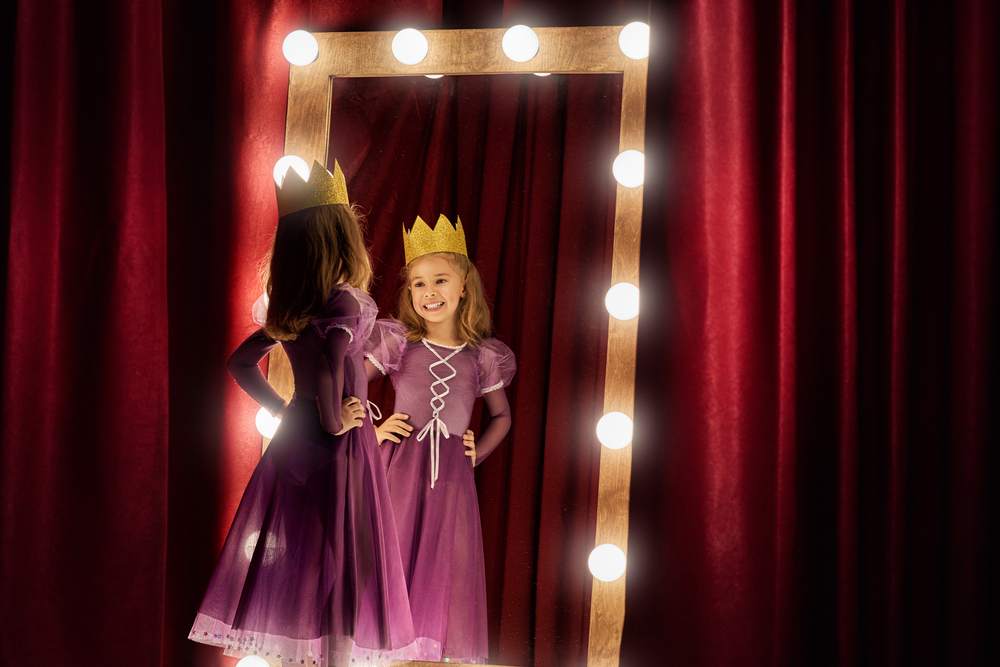
Playing for an audience provides a lot of benefits for children, and one of those has to do with their quick thinking and problem-solving skills.
Picture this: your child is playing through their recital piece that they’ve practiced a thousand times and they’re feeling great. Suddenly a finger slips and they hit the wrong note. What do they do? Do they panic and stop and run off the stage? Or do they correct the mistake, adapt, and keep playing?
For most children, the latter of those two scenarios is what will take place even if you haven’t talked to them about what to do in the event of a mistake. Why is this? It’s all about adapting and making the best of a situation. It’s natural for children to try to adapt in a difficult situation even if they haven’t been prepped on how to do so.
The more opportunities they have to perform for an audience, the more they will learn how to think on their toes and correct any issues that may crop up. Young musicians will learn about problem-solving and being flexible in a performance situation, improving their executive functioning skills in other areas of their lives as well.
You and your child’s music teacher can have conversations leading up to performances about what to do if they make a mistake. Remind them that it’s normal and okay to make mistakes, even during a performance, but what matters most is how they continue moving forward after a mistake.
Performing Live Can Help Young Musicians & Singers Learn That It’s Okay To Commit Mistakes
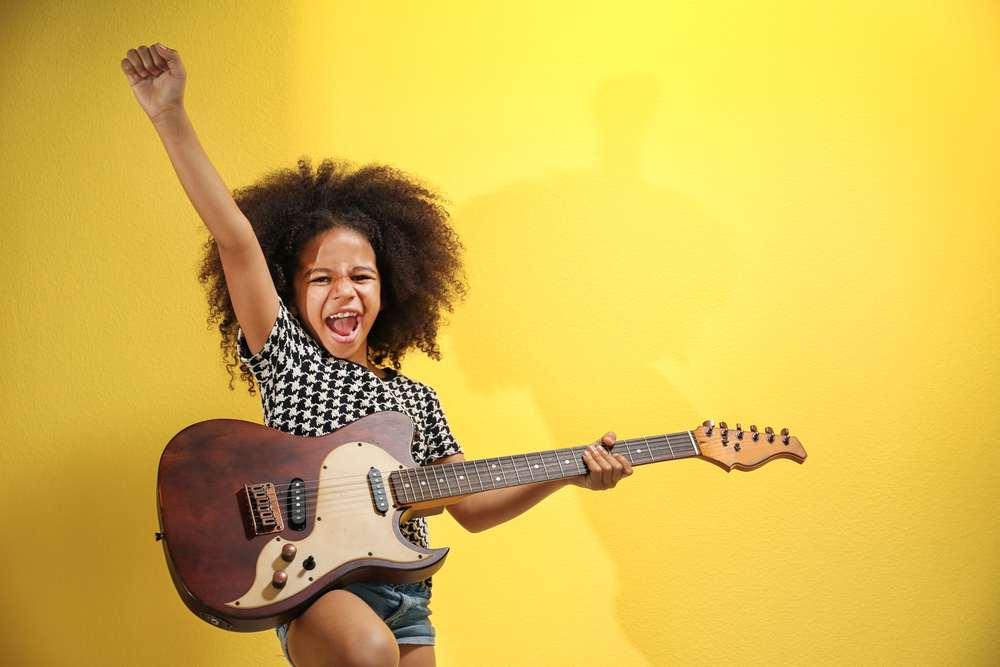
As previously mentioned, if your child performs in front of an audience, they are bound to make mistakes. You should reaffirm over and over that making mistakes is absolutely fine. It’s proof that they are learning and growing and taking risks, and they should not be afraid of making mistakes.
In fact, the more your child learns about making mistakes during s performance, the better they will handle making mistakes outside of music. As adults, we know that making mistakes at work, in relationships, and in life is simply inevitable. We have to learn how to adapt and learn from those mistakes. We can teach our children the same thing. And the sooner they learn that making mistakes is okay, the better off they will be later in life.
We can teach our children about growth mindset from an early age, showing them that mistakes are part of learning. Rarely does anyone find amazing success without making mistakes along the way, and the more we can reiterate this to our children, the more comfortable they will be trying new things and taking risks.
Performing Fosters Creativity & Self-Expression
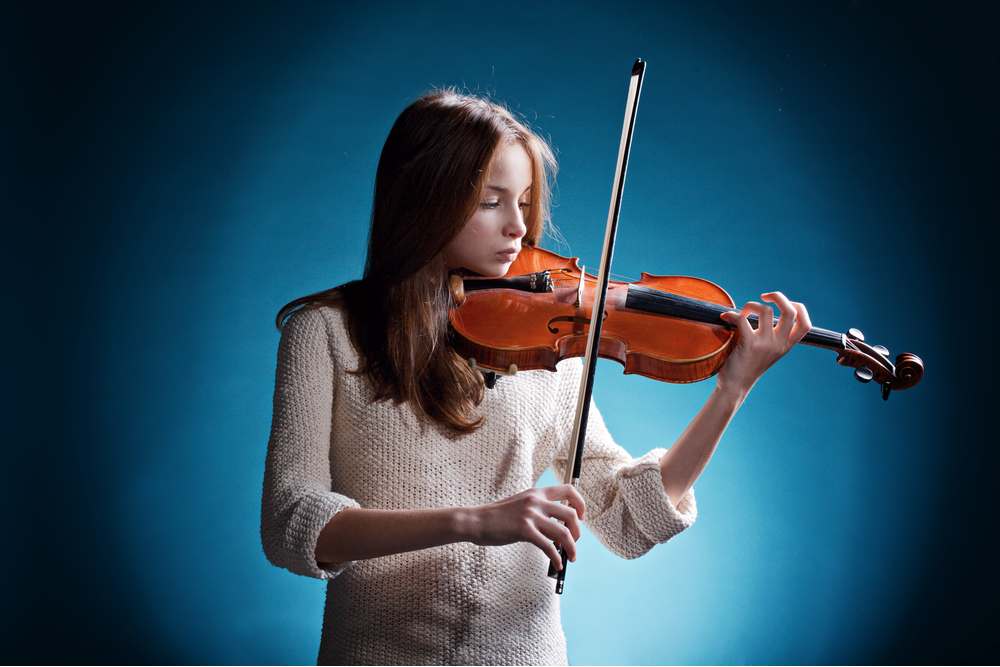
Have you ever found yourself lost in a song? Simply feeling the music in your body, perhaps daydreaming or imagining yourself in a different place than you actually are?
Music can transport us to a different time and location in our minds, and it can get our creative juices flowing like nothing else can. Music allows us to feel things we wouldn’t otherwise feel, and it can help us tap into our imaginative side in a big way.
It’s not only the music itself that does this, but playing music can have a big impact on our creativity and self-expression. Performing music can really put someone in a magical place, as they feel what they’re playing and let it take over their mind and heart.
When a child is passionate or excited about a piece of music, you can often see that in their playing. They may move their body in a way that shows you they are feeling the song in their soul. They may feel free after playing the song and have a sense of joy and peace that can only come from playing music they love.
Giving your child an opportunity to feel and experience these things is invaluable. Allow them to foster their own creativity in their music, and encourage them to express how they feel through their playing and performances.
Performing Live Creates Memories To Last A Lifetime
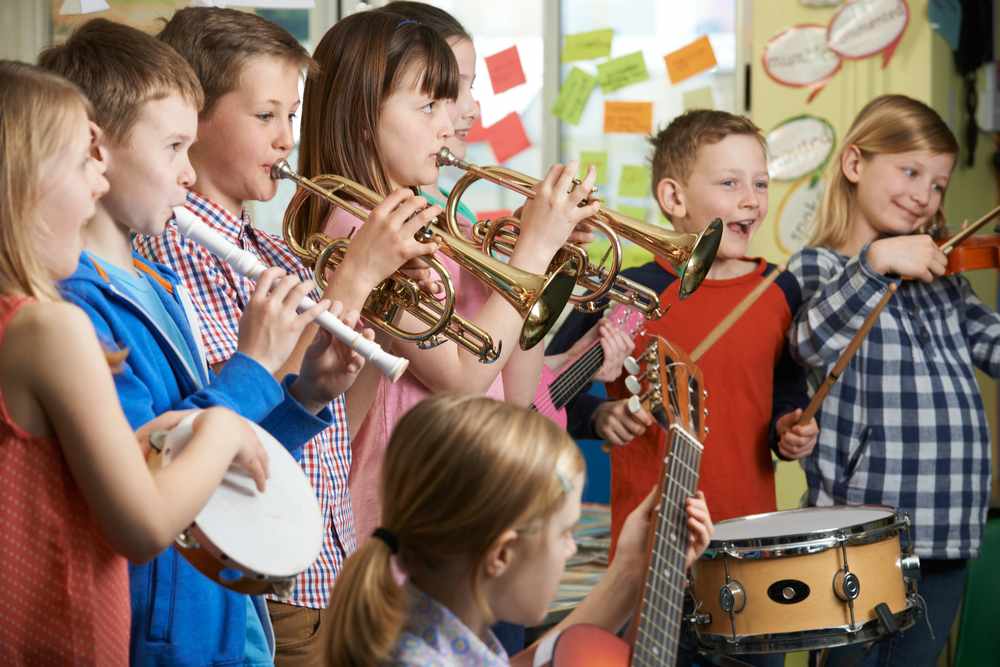
If you’ve ever performed anything live, you probably don’t need an explanation for this category.
There is nothing quite like performing live and experiencing the rush and excitement that it brings. The nerves and the jitters leading up to the start of your performance can make you want to change your mind. But then you go for it and begin your performance. The beginning may feel a little rocky, but soon you get into your groove and then you start to feel like you were made to do this. You continue on with confidence, knowing you’re doing your best and enjoying every second. Finally, you finish performing and you hear resounding applause and cheers from the audience. You stand to acknowledge your captive audience, appreciative to everyone who’s helped you on your journey and encouraged you along the way. You walk off the stage, feeling ecstatic, proud, fulfilled, and accomplished. As much as you were panicking before the performance, now you can’t wait to do it again.
Your child deserves to walk through that experience, especially when they’ve spent countless hours practicing an instrument. They should get to showcase their skills and experience that incredible sense of accomplishment that only comes from a live performance.
Those performance opportunities create incredible memories that are going to stick with your child for their entire lifetime. Even when they are grown up, whether they continue playing their instrument or not, they will relish those moments of performing and will hold those experiences dear to their hearts.
Performing Gives A Sense Of Pride & Accomplishment
Every person deserves the feeling of accomplishing something great. Working hard toward a goal and putting in the effort to get there is something to be celebrated, and performing live gives your child an opportunity to enjoy that accomplishment.
Just as athletes love to be praised for a good performance in a game, musicians should get their own celebration of achievement and success after a musical performance. Everyone loves to be cheered for and told they are wonderful, and when a child works hard at their musical skills, they should get that praise.
While musicians generally don’t play their instrument for the glory or the recognition from others, it certainly doesn’t hurt to get that recognition. Family members are typically quick to attend baseball games and soccer games and dance performances, but they may not be as quick to show up to a piano recital or a band concert. However, children should be celebrated for working hard toward anything, even if it’s not traditional and glorious in terms of what people view as exciting and successful.
Allow your child that sense of accomplishment and pride that comes from performing their musical instrument in front of an audience. Whether they have a large support system or not, encourage them to work hard, do their best, and enjoy the excitement and rush of the performance. Remind them how proud you are of them and more importantly, how proud they should be of themselves for all they’ve achieved in their musical journey.
How To Prepare Before A Performance

Leading up to a performance, your child might feel a mix of emotions. Anxious, excited, and nervous are common feelings before taking the stage. But before they actually perform, there are a handful of things you can do as a parent to help them be as ready and prepared as possible.
Encourage Practice
For the months and weeks leading up to their performance, encourage frequent practice. Remind them of their upcoming performance and how important it is to be prepared. Help make time for practice and give ample opportunities for small at-home performances to help them understand the feeling of performing.
Don’t Add Unnecessary Pressure
Children are often their own worst critics, so try not to add unnecessary stress and pressure leading up to their performance. Instead of being a critic or doubling as a teacher, be their cheerleader. Tell them they’re doing great, encourage their good practice habits, and reassure them that their performance is going to be fantastic.
Tell Family and Friends
Tell those important people in your child’s life about their performance and encourage them to show up. Recruit a cheering squad, bring flowers, take pictures, and make it a spectacle. Show your child how proud you are and recognize their efforts leading up to the performance.
Be On Time and Prepared on Performance Day
Your child will likely be a ball of nerves on the day of their actual performance, but you can help alleviate stress by being prepared and on time on that day. Make sure you keep the day as normal as possible beforehand, and make ample time for getting ready and traveling to the venue. Be on time to the performance location so that your child has a chance to slow down and breathe before they perform.
Celebrate!
Celebrate your child’s success and performance in whatever way they will most enjoy. Bring them flowers, go out to dinner, or have family over afterwards. Be a positive voice as they reflect on their performance, and reaffirm your pride in all they’ve accomplished.
Supporting Your Young Performer All The Way With Private Lessons
Regardless of how your child is getting their musical education, you may wish to get them plugged in to additional musical outlets to further their growth. Private music lessons are a fantastic way to encourage additional learning as they provide one-on-one instruction and personalized teaching that will meet your child right where they are.
Whether they have years of experience or are just starting out, a private music instructor can take them to the next leg of their musical journey. They can encourage, support, and push your student in ways you likely cannot as their parent, and they can set up performance opportunities to further their growth.
To learn more about private music lessons with Lessons in Your Home, contact us today.
